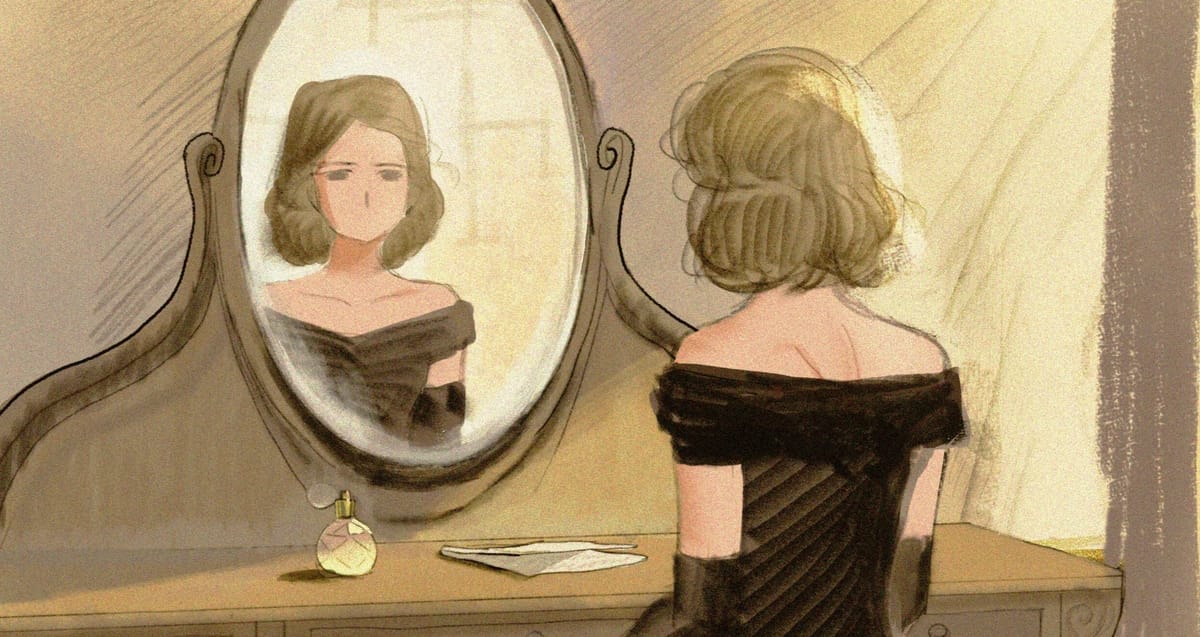Inheritance in Black Silk
The face of spring was only a veil to cover the winter that had long frozen over in her heart.

They said she was a well-raised girl—disciplined, graceful, quiet when necessary.
But they never wondered who taught her silence, or how deeply it cut.
Every gesture of hers had been practiced to perfection, not out of vanity, but out of survival.
She carried beauty like armor, and kindness like punishment.
You thought she was gentle; she was just exhausted.
Duty and responsibility—things everyone seems to carry—yet for her, they were always invisible chains. You thought she was always a kind girl in private, but you would never understand how those layers of white lace had already been washed through by tears, thousands upon thousands of times. Her kindness was a duty she performed for the world, but she was never that gentle with herself.
People imagined her as a pink cherry blossom in spring, symbolizing purity and the arrival of a new season. But you would never know that sixteen-year-old girl who cried quietly in the middle of the night, who was once so full of yearning for the world and always wrote down her favorite quotes from great minds in her notebook, hoping to share them with the world, one by one.
Her simplicity, her discipline, her tactfulness, her smile, her nod, her presence—all were cultivated through constant training by her family and society. She was entrusted with the “inheritance” because she was the eldest daughter. Inheritance was not just cultural, it was bloodline, it was family honor.
So she was often anxious, often forgetful, often in tears, but she had long grown used to this familiar corridor. This was where she wiped away her tears, sobbed aloud, and erased her rouge every day. She often lost her way in it, but would also find herself again, forgive the world again.
The treatment she prescribed for herself was always the same: tears, perfume, tissues, and a coat.
She would nod gently at you, smile at you—but don’t take it seriously. Underneath, she was exhausted and insecure; she would chat softly with you, but don’t believe her—her heart was already riddled with wounds, ugly like a dense web of spider silk, sickening in its closeness.
And so she wrapped herself in her tears. Each drop was her disappointment in and distrust of the times, though she had no strength left to accuse them. The perfume she sprayed was to cover and mask her damp warmth. The tissues were to prevent the freshly painted mask from smudging again. The coat was her final weapon against the world—not exaggerated, but quietly defensive, just as society and family required. So she carried them with her at all times, to keep herself from
falling again into that whirlpool with no way out.
The face of spring was only a veil to cover the winter that had long frozen over in her heart.
Do you know why she always wears a pair of black silk stockings beneath her skirt?
Because that’s her secret base. That’s freedom. That’s her silent protest against the world. She wears the gentlest dress, but you would never know—beneath that dress, the legs wrapped in black, tight-fitting stockings are her weapon of self-revolution.
Day after day, the girl drifts through a vulgar world, pondering, wandering, pondering again—only to wander once more. She continues to live as if caught in a reel of film, her presence blurred, always just out of focus.
The only thing that never changed was her simplicity, her discipline, her tactfulness, her smile, her nod, her aura. Just as society and family’s expectations of her had never changed and never disappeared, they followed her always. She had countless times fantasized that she was a sailboat on the sea, navigating her own life. She often imagined herself as the Mother of Mountains, calm and mature.
But in the end, all she could do was disinfect the mold on her body with alcohol, strand by strand as it consumed her. The white lace was neither mystery nor seduction—she was still herself.
Only people always over-fantasized her.
Winter was the season most suited to her, for in it, she could be alone, remembering the old-fashioned libraries of the Shōwa era, holding a warm, pure white porcelain cup filled with the
bitterest black coffee, while the taste of recently extinguished smoke still lingered on her lips.
To her, there was nothing more comforting. The Shōwa era was kind to her. The dim yellow glow of the vintage library preserved her aura, the coffee numbed her pain, and the smoke spoke aloud the agitation she kept buried within.
When winter passed, she still missed it. She still grew melancholic. But no one would ever understand that feeling of smiling with only the skin of her face while the soul stayed still.
It was a pain so sharp, a lost soul so vivid, and yet—as familiar as muscle memory. Only the girl herself knew. Her remedies seemed simple, but each time, they demanded so much time, so much of her.
Winter wasn’t the one who understood her best—it merely acted as a catalyst, a healing component in her silent equation. The world and her family never intended to forgive her. So she remained: simple, disciplined, tactful. She was just a template, like the jadeite cabbage in the National Palace Museum—placed there to be admired, but never truly understood.
Beneath the ornate surface was fragility, disgrace, collapse, madness, loneliness, anxiety, devastation, disappointment, fear, and endless tears that could never be fully wiped away. These things clung to her like scorpions with too many legs, refusing to let her go; like shadows in the dark, slowly consuming her dreams. They suffocated her. And that’s why, every time she wandered through
the corridor, she had to drag her hollowed body forward, her steps feeble and strained.
Because every footprint she left behind was so gentle, like a flower petal falling to the floor—no one would notice it had fallen, only the petal itself would know. The closer she came to the exit, the less it hurt. Because the exit was freedom, was oxygen, was winter.
And in that moment, the girl would wear the black dress she longed for, and spin lightly to the steps of a simple waltz on the dance floor—a gift for the soul that once lost its way. She no longer had to look clearly at the world. The blurrier the distance, the closer it felt to freedom.
What’s laughable is this—people spent over a decade looking at her, and never once saw her.
The girl never spoke, and no one asked. And so, she quietly deceived the world and her family for ten whole years.
The girl is still that same person who, at 1 a.m., would sit silently on a wooden bench and gently pick up her notebook to record famous quotes. But this time, she chose not to write down any more quotations. When she lifted the wine bottle, she found the wine had long disappeared without a trace. This time, she let her pen stand up. The pen, delicate and loyal, wove the pain of the times into language, and at last, the girl found a way to contain the world.
“Twinkle, twinkle, little star” still echoed in her ears—because, for as long as she could remember, it was the only power the world ever gave her. She still smiled, still nodded.
But this time, she whispered farewell to the world, and to inheritance, because she was too tired. And no one had ever come to tuck her in.
Farewell was an exit, yes—but it was also the first entrance of her life. The only way out of the black hole.
The only way into the universe.
Yu-An Huang (Lillian)





